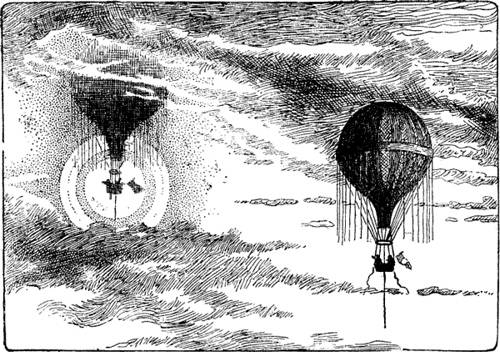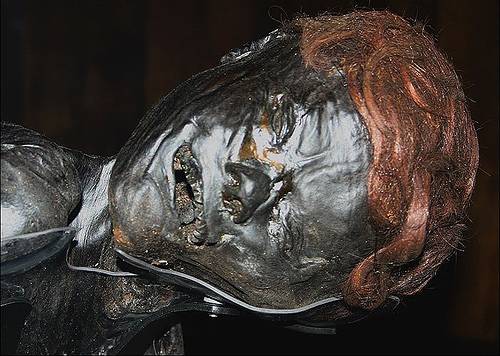
“Drill for oil? You mean drill into the ground to try and find oil? You’re crazy.” — Associates of Edwin L. Drake, refusing his suggestion, 1859

“Drill for oil? You mean drill into the ground to try and find oil? You’re crazy.” — Associates of Edwin L. Drake, refusing his suggestion, 1859
boanthropy
n. the delusion that one is an ox
In 1933, a group of four thugs came up with a gruesome way to make money. They took out three insurance policies on an Irish vagrant named Michael Malloy and killed him for the proceeds.
Well, tried to, anyway. Malloy proved to be almost unkillable:
None of this worked. Desperate, they ran him down with a taxi at 45 mph. This put him in the hospital for three weeks, but it didn’t kill him. Finally the trio waited until Malloy had passed out one evening, took him to a room and put a gas hose in his mouth.
That killed him, but they didn’t have long to enjoy the insurance money. Infighting among them led to rumors, and the police exhumed Malloy’s body and revealed the plot. One conspirator went to prison and the rest were electrocuted at Sing Sing.

French astronomer Camille Flammarion writes of a curious ballooning incident in Wonders of Earth, Sea And Sky (1902):
On April 15, 1868, at about half-past three in the afternoon, we emerged from a stratum of clouds, when the shadow of the balloon was seen by us, surrounded by colored concentric circles, of which the car formed the centre. It was very plainly visible upon a yellowish white ground. A first circle of pale blue encompassed this ground and the car in a kind of ring. Around this ring was a second of a deeper yellow, then a grayish red zone, and lastly as the exterior circumference, a fourth circle, violet in hue, and imperceptibly toning down into the gray tint of the clouds. The slightest details were clearly discernible — net, robes, and instruments. Every one of our gestures was instantaneously reproduced by the aerial spectres. … It is … certain that this is a phenomenon of the diffraction of light simply produced by the vesicles of the mist.

The English Benedictine monk Eilmer of Malmesbury saw Halley’s comet as a young boy in 989.
When he saw it again 76 years later, he declared: “You’ve come, have you? … You’ve come, you source of tears to many mothers. It is long since I saw you; but as I see you now you are much more terrible, for I see you brandishing the downfall of my country.”
The year was 1066. That October, with the Battle of Hastings, the Normans began their conquest of England.

Hungarian composer György Ligeti’s Poème Symphonique for 100 Metronomes calls for fivescore clacking timepieces to be set up across the stage, wound fully, and set to different speeds. Once they’re all going, the performers leave, the audience enters, and everyone watches them run down.
This takes 20 minutes. “It is up to the conductor to decide the duration of the pause, before he leads the players back on to the stage to receive the thanks due from the public.”
In 1969, French author Georges Perec wrote a 300-page novel without the letter e:
Noon rings out. A wasp, making an ominous sound, a sound akin to a klaxon or a tocsin, flits about. Augustus, who has had a bad night, sits up blinking and purblind. Oh what was that word (is his thought) that ran through my brain all night, that idiotic word that, hard as I’d try to pin it down, was always just an inch or two out of my grasp — fowl or foul or Vow or Voyal? — a word which, by association, brought into play an incongruous mass and magma of nouns, idioms, slogans and sayings, a confusing, amorphous outpouring which I sought in vain to control or turn off but which wound around my mind a whirlwind of a cord, a whiplash of a cord, a cord that would split again and again, would knit again and again, of words without communication or any possibility of combination, words without pronunciation, signification or transcription but out of which, notwithstanding, was brought forth a flux, a continuous, compact and lucid flow: an intuition, a vacillating frisson of illumination as if caught in a flash of lightning or in a mist abruptly rising to unshroud an obvious sign — but a sign, alas, that would last an instant only to vanish for good.
Remarkably, La Disparition has been translated into six different languages, each imposing a similar constraint — the Spanish, for instance, contains no a, and the English, here, no e.

Celts killed each other. During the Iron Age, they’d stab, bludgeon, hang, and strangle their victims, then dump them in the sphagnum bogs that dot Northern Europe, sometimes with the ropes still around their necks.
We know this because the acidity of the bog water, the cold temperature, and the lack of oxygen have effectively prevented these corpses from decomposing. More than 700 bodies have been recovered, some as old as 10,000 years and some still appearing fresh enough to be mistaken for recent murder victims.
The “Grauballe Man,” above, was found in 1952 by a Dane digging for peat. His throat was cut in 290 B.C., but his body was well enough preserved to yield fingerprints. Why was he killed? Maybe ritual, maybe execution for a crime, maybe human sacrifice. Here’s one odd clue: Judging from their nutrition and manicures, the bodies appear consistently to have been from the upper classes.
“Man is the only animal that laughs and has a state legislature.” — Samuel Butler
Predictions by Scottish mathematician and physicist Lord Kelvin, president of the Royal Society:
Speaking to the British Association for the Advancement of Science in 1900, he said, “There is nothing new to be discovered in physics now; all that remains is more and more precise measurement.” Einstein’s annus mirabilis came five years later.